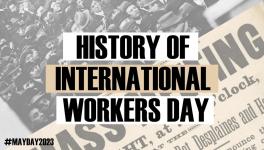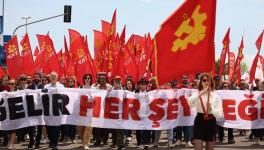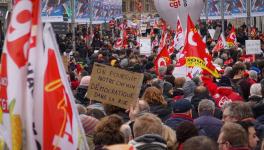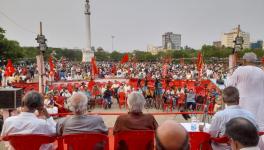French Workers Rally Against Slew of Anti-Labour Policies
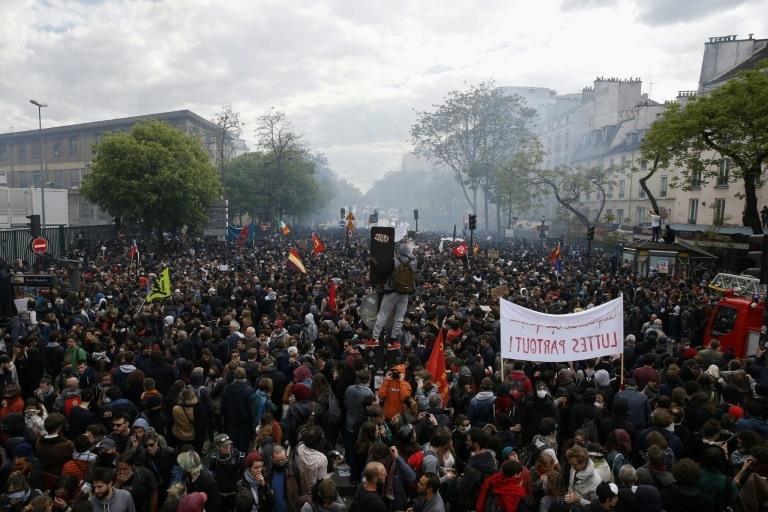
The threat of the privatization of the State-owned Railways and the attack on the job security of its workers saw railway unions mobilize on a large scale on May 1
On May 1, French President Emmanuel Macron landed in Australia for his Pacific tour. The previous weeks had seen him attempt to position himself as a global statesman. However, the workers of France seemed less than impressed, as anywhere between 143,000 and 210,00 people took to the streets in May Day rallies in defence of labour rights. The rallies come in the context of a sustained attack on labour rights after the former Rothschild banker assumed the presidency last year.
The plethora of reforms implemented or proposed under his government have affected all sections of the working class - railway workers, civil servants, employees in public and private sector, retirees and students - all of whom have been actively participating in a series of strikes from the end of March.
Under the banner “against Macron and his world”, 4,200 protesters gathered in Marseille at the call of General Confederation of Labour (CGT), a powerful left-wing union in France, which has been at the forefront of mobilizing people for the ongoing rolling strikes in defence of railway workers’ rights. Up to 4,000 people came on to the streets in Nantes in response to the call by CGT, which was backed by the Solidaires Unitaires Démocratiques (SUD), Solidaires and student unions. According to the police, about 2,000 more marched in the streets of Bordeaux and Strasbourg, 4,000 in Grenoble and around 5,500 in Lyon.
In Toulouse, 8,000 people reportedly took to streets, backing the demands of railway workers - withdrawal of the proposed amendments to French national railways (SNFC). These amendments allegedly lay the groundwork for privatization, and also strip future railway employees of the special status which gives those working now high job security.
The capital city of Paris, where the parade started around 2:30 p.m. saw the highest participation, with 20,000 to 55,000 people taking to the streets. The thousand odd-members of the radical Black Blocks garnered maximum media attention as they clashed with the police, who used tear gas and water cannons against them. Over a 100 were arrested.
This collective of anti-fascists and anarchists had called on Facebook for a “Revolutionary day” - to “make a day in hell” for “Macron and his world”. During the march, members of the group reportedly smashed the windows of some businesses, including a Renault garage, set a McDonalds ablaze in eastern Paris, and scribbled anti-capitalist graffiti on walls.
Their tactics came in for criticism, including from Benoît Hamon, founder of movement Generation and former member of the Socialist Party, and founder of the Left Party, Jean-Luc Mélenchon. However, explaining their resort to violence, Remy Peperaud, author of an academic work on this autonomous movement which operates on the sidelines, said the “main objective of this violence is to make visible to everyone the invisible war that is going on according to them in our societies.”
“These are often students who take part in actions in support of undocumented migrants or against police repression. They try to integrate their libertarian political ideal in all spheres of their life, making sure to be perfectly autonomous, that is to say, to depend neither on the State, nor on an owner, nor of an employer to subsist. There are many who live in community squats where they grow, for example, their food to spend money as much as possible.”
Contrary to many reports which suggested that the CGT’s call for a unitary march went unheeded, with scattered demonstrations suggesting ruptures in the left movement, the Liberation said in a commentary, “all leftist forces decided to parade on May 1st,” explaining that the distributed demonstrations allowed for unity to be celebrated at multiple venues during the parade. While many observers called out the more moderate trade union, CFDT, for not participating in the march, the report pointed out that CFDT “has replaced the traditional march, not by two brief whistles, but by a film session that will undoubtedly exalt union unity.”
Get the latest reports & analysis with people's perspective on Protests, movements & deep analytical videos, discussions of the current affairs in your Telegram app. Subscribe to NewsClick's Telegram channel & get Real-Time updates on stories, as they get published on our website.











